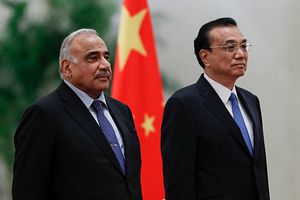Iran is all over Iraq, U.S. Middle East watchers warn. At his nomination for U.S. ambassador to Iraq this March, Matthew Tueller mentioned Iran 17 times in his written statement. This concern with Iranian influence was echoed at a Senate Foreign Relations Committee hearing a few months later, where officials from the State and Defense Departments advocated continued American engagement in Iraq as a buffer against Iran. One does not have to look far for pieces outlining strategies for containing Iranian expansionism in its western neighbor.
Analysts are right to worry about foreign influence in Iraq — a weak state racked by sectarian tension and extremism and currently embroiled in mass social unrest. Yet while the United States fixates on Iranian ambitions, a far more formidable power has stepped in. Last month, Iraqi Prime Minister Adel Abdul-Mahdi revealed that his country was signing on to China’s signature Belt and Road Initiative (BRI). His announcement coincided with his state visit to Beijing, which the Chinese Communist Party (CCP) regime feted with habitual adulation in state media.
Amid the typically tumultuous Middle East news, Abdul-Mahdi’s visit and BRI announcement made few headlines. But the United States and others ought to pay attention as China adds another feather to its BRI cap.
Iraq and China had quietly begun to deepen their relationship before this year. In 2015, Haider al-Abadi, Abdul-Mahdi’s predecessor, took a state visit of his own to China, where the two sides concluded an agreement on a “strategic partnership.” Iraqi oil exports to China jumped to approximately $20 billion last year, making Iraq the country’s fourth largest supplier.
It’s no wonder why China has its sights on Iraq. Endowed with enormous oil reserves (the world’s fifth largest) and a strategic geopolitical location, Iraq has much to offer as China puts in motion its plans to dominate Eurasian trade. Iraq’s proximity to maritime nations in the Mediterranean (Beijing is actively courting or has already inked formal deals with Egypt, Israel, Lebanon, Syria, and Turkey) and in the Gulf is a boon to the BRI. In Baghdad, Beijing has found a bridge between those shipping lanes and its ever growing footprint in Central Asia and Iran. Chinese infrastructure now dots the landscape contiguously from East Asia to the Mediterranean.
Middle Eastern countries, which in 2018 received a whopping $28 billion in BRI investments, play a crucial role in China’s grand strategy. Under CCP General Secretary Xi Jinping, Beijing has aggressively made overtures throughout the region. Though ostensibly economic in nature, these emerging ties will almost certainly grow Chinese political power across the Middle East. One harbinger came this summer: To appease the serial human rights violator, Iraq was one of the 50 countries that praised Chinese policies in Xinjiang after a UN Human Rights Council letter blasted China over its treatment of the Uyghur Muslim minority. This is a sign of Beijing’s willingness to exploit the economic dependence of Iraq and other BRI clients as a means to advance its political aims.
If other developing countries in the BRI are a barometer, then Iraq may have signed up for more than it can handle. Consider Pakistan. Islamabad’s partnership with Beijing hasn’t shielded the former from incurring massive BRI debts, which have put the brakes on billions worth of remaining projects. Time will tell whether Iraq can avoid a similar fate, and Iraq alone should decide with whom to do business. But it should bear in mind that China may be a perilous patron that misleads unwitting states. At a 2015 press conference in the Rose Garden, Xi adamantly disavowed Chinese ambitions to militarize its illegal islands in the South China Sea. So much for that fantasy. Although some consider Chinese investment a remarkable opportunity for Iraq, big dreams elsewhere have not always panned out.
All this is not to deny the United States’ enduring influence in Iraq. Stationed there are several thousand American troops. The American embassy in Baghdad is the largest in the world. Defense ties between the two countries are robust — the United States has furnished over $23 billion in military sales since 2003. Some have warned that as U.S. partners grow more reliant on Chinese money, Beijing could pressure them to limit security cooperation with Washington. The United States may be forced to do so preemptively, as Mike Pompeo has said could happen with Israel, the strongest U.S. ally in the region. The U.S. government has also told other countries to cut ties with Chinese telecommunications giant Huawei, which has an established presence in Iraq, or risk diminished intelligence sharing.
Americans may very well be sick of Iraq following years of alarmist coverage of Saddam Hussein, sectarian violence, and Islamic State. But now is not the time to shun the country — or the region for that matter. Wherever the United States looks to disengage, Xi and his regime stand ready to fill the void.
In Iraq, Iranian meddling is certainly a threat to the country’s stability and the national security interests of the United States and its allies that plays well politically. But let’s not turn a blind eye to a more menacing threat in China.
Daniel J. Samet is Program Assistant for Middle East Programs at the Atlantic Council. The views expressed here are his own.

































